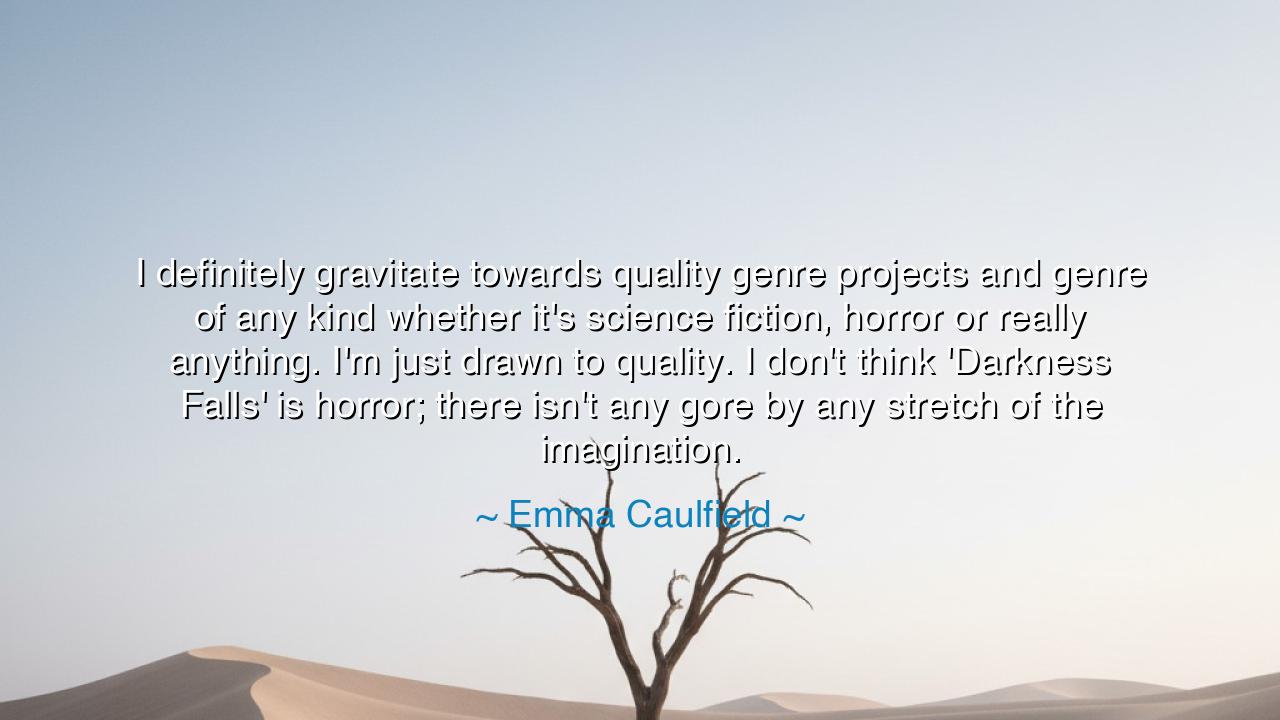
I definitely gravitate towards quality genre projects and genre
I definitely gravitate towards quality genre projects and genre of any kind whether it's science fiction, horror or really anything. I'm just drawn to quality. I don't think 'Darkness Falls' is horror; there isn't any gore by any stretch of the imagination.






"I definitely gravitate towards quality genre projects and genre of any kind whether it's science fiction, horror or really anything. I'm just drawn to quality. I don't think 'Darkness Falls' is horror; there isn't any gore by any stretch of the imagination." These words spoken by Emma Caulfield reflect a deep truth about the nature of artistic choices and the pursuit of excellence. In this statement, Caulfield draws a distinction between genre and quality, asserting that her attraction lies not in a genre’s ability to conform to certain conventions, but in its capacity to deliver a meaningful, compelling experience. Whether in science fiction, horror, or any other genre, what captivates her is the quality of the work—not its adherence to expectations. The key, she suggests, is to look beyond superficial labels and to engage with the deeper, more substantial qualities of the piece.
In the ancient world, quality was always the hallmark of great craftsmanship. The Greeks cherished excellence in all endeavors, whether in the arts, philosophy, or athletics. In Plato's Republic, the idea of the ideal form—something that is perfected in essence—was a driving force in their philosophy. Just as a sculptor would not be satisfied with a statue that lacked the grace or proportion of the ideal form, so too must the artist of any medium, be it acting, writing, or painting, seek a form of quality that transcends mere adherence to convention. Caulfield, in much the same way, expresses a preference for substance over superficiality, for depth over formulaic expectations.
Consider the story of Sophocles, whose tragedies set the standard for dramatic excellence in ancient Greece. His works, such as Oedipus Rex and Antigone, were not bound by the conventions of genre but were driven by a deep exploration of human suffering, fate, and morality. Sophocles did not write merely to entertain or shock, but to provoke thought, to engage the audience on an intellectual and emotional level. He crafted plays that explored the depths of human nature, blending drama with philosophy, not constrained by the idea of genre, but focused solely on the quality of the experience. Caulfield, in her choice of roles, seeks a similar ideal—projects that are defined by their substance rather than by the genre they belong to.
In the modern world, quality in genre projects can often be overshadowed by commercial interests or the desire to follow trends. Hollywood has seen its fair share of films that are labeled horror, yet rely heavily on gore and shock value to create an impression. However, works such as Alfred Hitchcock’s Psycho or Stanley Kubrick’s The Shining are often categorized as horror, yet they transcend the genre by delving into the psychology of their characters, creating an atmosphere of unease rather than relying on mere violence. These films remain classics because they are built on subtlety, tension, and storytelling—qualities that allow them to stand the test of time.
Caulfield’s perspective also resonates with the ancient idea that true artistry lies in the ability to transcend the medium, to lift it beyond its conventional boundaries. Just as the ancient Greek sculptures and paintings sought to achieve perfection, so too must modern artists—whether filmmakers, musicians, or writers—strive to create works that elevate their genre, that transform it into something greater than its superficial elements. Caulfield’s comment about Darkness Falls suggests that the true value of a project lies in the craftsmanship behind it, in its ability to evoke a deeper response, not merely to fit the mold of a particular genre.
This brings us to the lesson that Caulfield’s words impart: that excellence is not bound by genre, tradition, or trend. Whether in art, in life, or in our daily pursuits, the pursuit of quality should always be at the forefront. We must not be content with what is expected, but must instead seek to elevate the standard of what we create. Like Caulfield, we should allow our imagination and talent to guide us, looking beyond the surface to create something that is meaningful, deep, and true to our vision.
In our own lives, we are encouraged to seek the quality of our actions, not simply to conform to the expectations set by others. Whether in our work, relationships, or creative endeavors, we should strive to transcend the ordinary and push for something greater. Quality is the mark of true achievement—it is what allows us to stand apart, to elevate our work, and to create something that speaks to the heart and mind of others. Just as Caulfield seeks roles that transcend genre, we too must seek to live lives that transcend the expected, lives that are rich with purpose, integrity, and authenticity.






AAdministratorAdministrator
Welcome, honored guests. Please leave a comment, we will respond soon